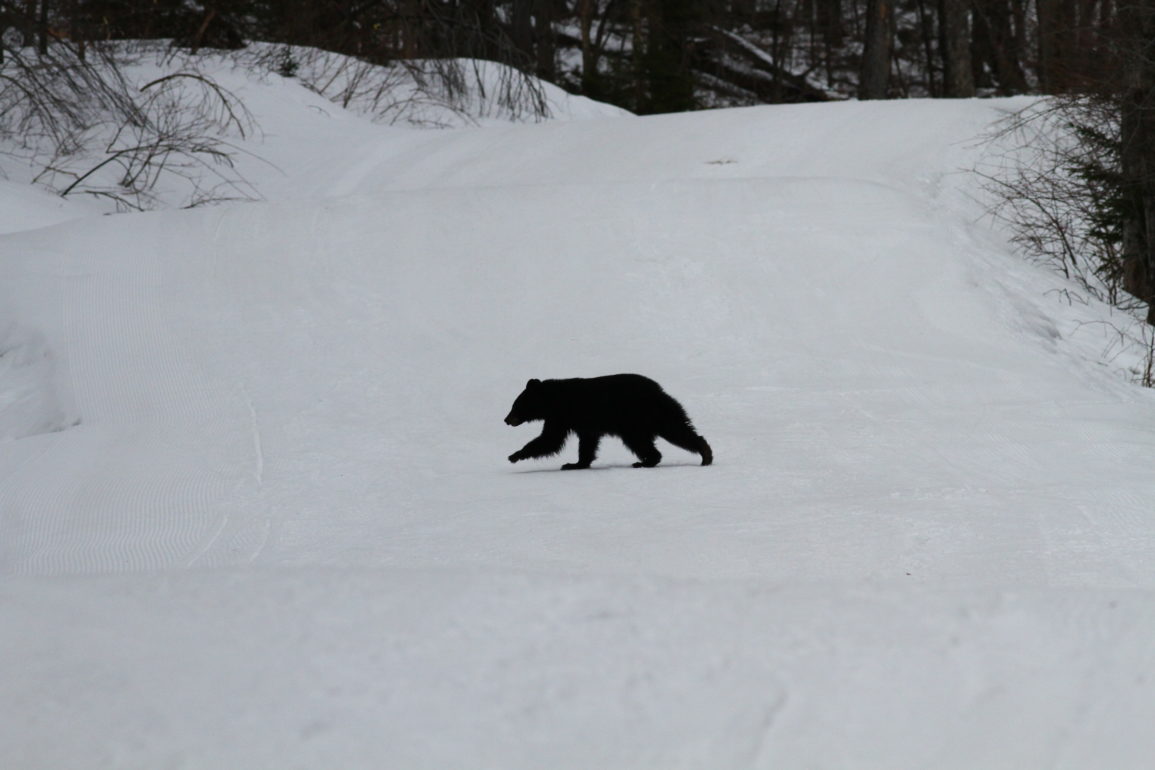April is a time of transition in Vermont. As skiers and riders are enjoying late season turns on soft snow, black bears in Vermont are coming out of their winter dens in search of food. Bear sightings are popping up again, and the newly formed Mad River Valley Black Bear Initiative is helping to educate us on how to be better stewards of our ursine neighbors.
The Sugarbush Safety Environment & Wellness (SEW) Committee, Fayston, Waitsfield and Warren Conservation Commissions, Moretown Recreation Committee, Friends of the Mad River, and Stark Mountain Foundation have formed a committee of volunteers to address the growing black bear concerns the Mad River Valley has been experiencing over the last few years. Though very much in the early stages of planning, the initiative hopes to develop a centralized education and resource center for the MRV community to learn about black bear, develop a community bear ethos about how to live with and protect bears, and increase the community’s understanding of how human actions impact and affect bear behavior.
The American Black Bear (Ursus americanus) is the smallest of the three bear species found in North America. It is the only bear found in Vermont. Black bears are members of the order Carnivora, which also includes dogs, cats, weasels, and raccoons. Black bears are relatively shy animals and prefer wild areas with fewer people. However, our actions often encourage bears to come out of the forest by providing easy food sources. When bears become used to these easy food sources and have frequent contact with humans they become more dependent on human foods and less wary of us.
The MRV Black Bear Initiative volunteers began meeting remotely in November 2021. With the help of stewardMRV they have launched a black bear informational website at www.madrivervalley.com/stewardmrv/living-with-bears.
The initiative also recently hosted a public presentation with Jaclyn Comeau, biologist with the State of Vermont’s Bear Project, from the Vermont Fish & Wildlife. The presentation explored bear ecology and conflicts between people and bears and what we can do to prevent conflicts. You can watch it here: https://mrvtv.com/711378-2/. Below are some quick tips on keeping bears wild and minimizing conflicts.
Bear Friendly Checklist
- Only feed birds during winter months when bears are not active
- Consider planting native plants to attract birdswww.audubon.org/native-plants
- Keep garbage secure with locking mechanisms and control odors
- Maintain proper compost recipe
- 3 parts brown material (leaves, paper, sawdust/wood chips, hay, etc)
- 1 part green (kitchen scraps and grass)
- Avoid meat and dairy
- Use electric fences for chicken coops and beehives
- Promptly harvest ripe fruits
- Keep your grill clean
- Do not feed pets or store pet food outside
Upcoming presentations on bears!
Bear with Us: Living with Black Bears in the North Country: A virtual presentation with Sue Morse of Keeping Track. Hosted in partnership with Northeast Wilderness Trust and the MRV Black Bear Initiative.
Tuesday, May 10, 5:30 pm – stay tuned for more info.

